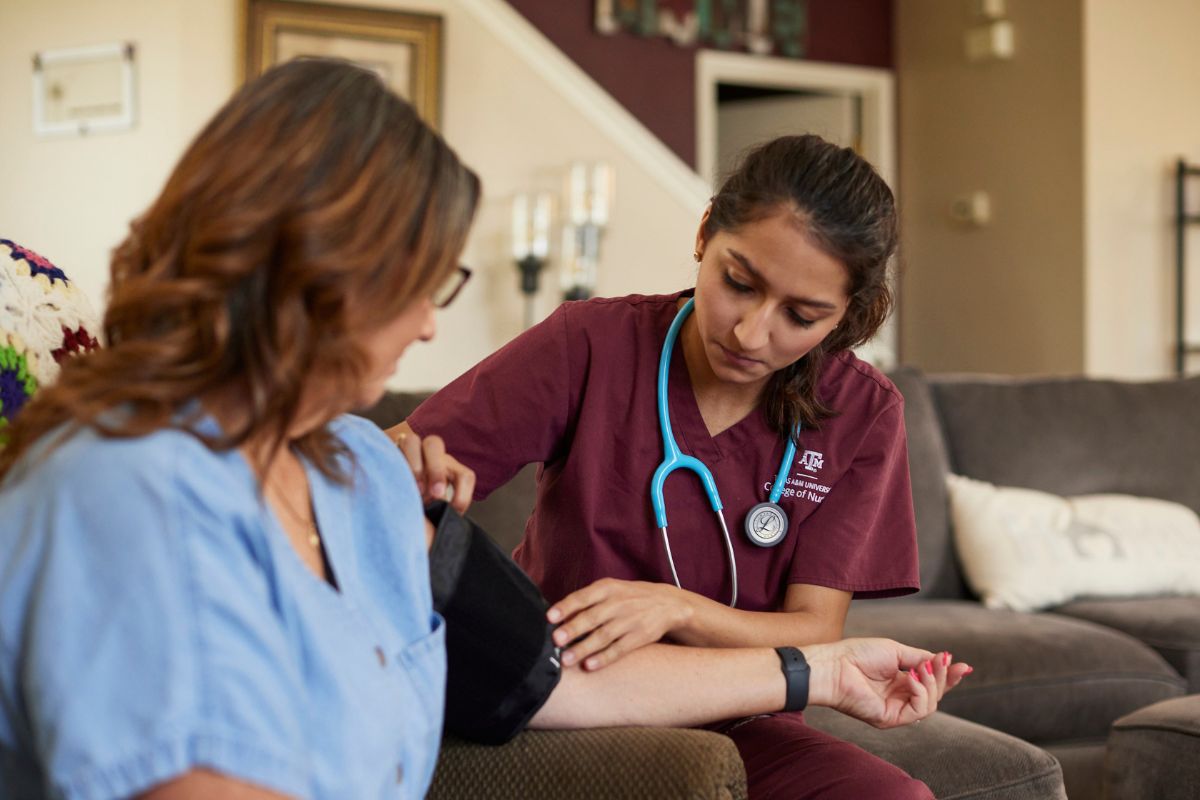The Texas A&M College of Nursing is committed to addressing the critical nursing shortage across Texas, and strives to produce the best prepared nurses and the most advanced nursing research. As leaders, our graduates are taught to question traditional methods and to continually seek the best practices based on relevant clinical research. Through community service and leadership opportunities, the College of Nursing fosters a sense of social responsibility and global citizenship. We are developing research innovations to enhance the education and preparation of nurses, improve the delivery of patient care across an eclectic array of populations and translate research evidence into practice.
The College of Nursing offers three bachelor degree tracks and three master’s degree programs.
The Traditional BSN track is for students who have completed two years of prerequisite coursework, from Texas A&M or another institution. Students choosing the Traditional BSN track complete 120 credit hours of general education and professional nursing course work. The first two years of the curriculum include prerequisite courses in the humanities and biological, physical and behavioral sciences to provide a foundation for growth in the nursing major. The prerequisite courses may be completed at any accredited college or university. Students will then apply for upper-level entry into the Traditional BSN program to complete the third and fourth years in clinical and non-clinical nursing courses. This track is offered at the Bryan/College Station campus.
The Second Degree BSN track is a 15-month, accelerated program for those who have already obtained a bachelor’s degree in a non-nursing area of study. The track utilizes traditional, face-to-face instruction as well as simulation activities, clinical experiences, team teaching and video conferencing of lectures. This option is offered at the Round Rock campus.
The RN to BSN track is for those who are already registered nurses with an associate’s degree who want to obtain a bachelor’s degree in nursing. RN to BSN applicants who completed their degree through an LVN to RN, ADN to RN, paramedic bridge program or a diploma program must have earned a minimum of 35 transferable credits in their program in order to apply. This option is available in full-time and part-time course loads, and offered entirely online.
The MSN-Nursing Education program teaches graduates to apply principles of education in the role of educator in various patient care settings and in institutions of higher education through completion of a 36-hour curriculum. When taking NURS 653 Advanced Health Assessment, students will be expected to attend two separate on-campus clinical experiences for a total of 45 hours to meet the clinical objectives of this course as set forth by the American Association of Colleges of Nursing for any MSN degree. This option is offered primarily online allowing students to balance career, family and other responsibilities while advancing their education.
The MSN-Family Nurse Practitioner program teaches graduates to practice as primary care providers to a wide range of clients while focusing on health promotion, risk reduction, disease prevention and illness management through completion of a 36-hour curriculum. When taking NURS 653 Advanced Health Assessment, students will be expected to attend two separate on-campus clinical experiences for a total of 45 hours to meet the clinical objectives of this course as set forth by the American Association of Colleges of Nursing for any MSN degree. This is a hybrid program, with the majority of the coursework delivered online.
The MSN-Forensic Nursing program teaches graduates to care for victims and perpetrators of traumatic events or criminal acts that result in trauma or death. While caring for their patients, they will also be responsible for observing, recognizing, collecting and documenting forensic evidence related to the traumatic event or criminal act for subsequent use in civil or criminal legal proceedings through a 36-hour curriculum. Students are asked to come to the Bryan-College Station campus for orientation and a limited number of class activities. When taking NURS 653 Advanced Health Assessment, students will be expected to attend two separate on-campus clinical experiences for a total of 45 hours to meet the clinical objectives of this course as set forth by the American Association of Colleges of Nursing for any MSN degree.
The Doctor of Nursing Practice (DNP) degree prepares graduates for practice-based leadership and to combat the shortage of advanced practice providers. Building upon the experiences and education already held as professional nurses, the DNP program supports students in effectively analyzing and evaluating the quality, safety, effectiveness and efficiency of patient care and systems of care. This part-time clinical doctoral degree program is delivered asynchronously online across 7 semesters and equips advanced practice registered nurses to serve in advanced roles as practice-oriented scientists. Graduates will develop skills supporting the translation of evidence into clinical practice, the measurement of patient outcomes and the transformation of health care systems to ensure quality and safety.
What do you want to do with Nursing?
Career ideas for Nursing majors:
Registered Nurse, Nurse Education, Nurse Practitioner, Forensic Nursing

Average Salaries
Check out the salaries of Aggies who've graduated with this major!
Who Hires This Major
Search companies who have hired Aggies with this major!
